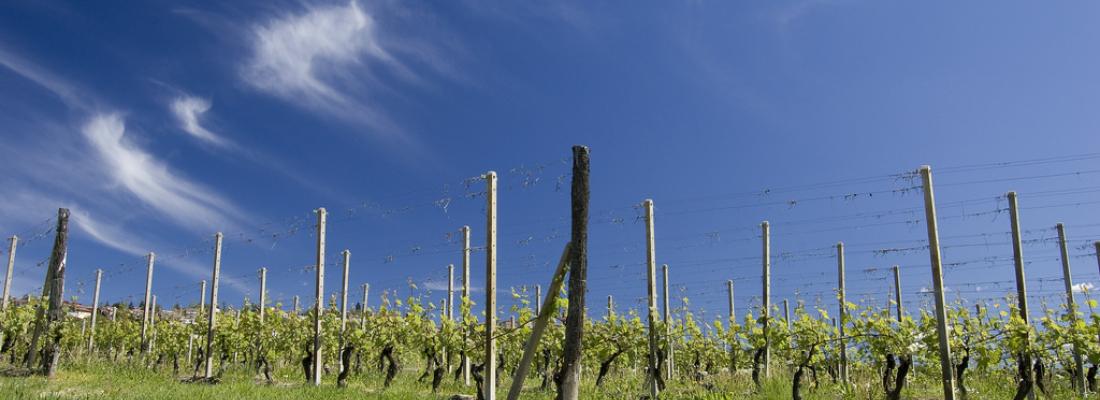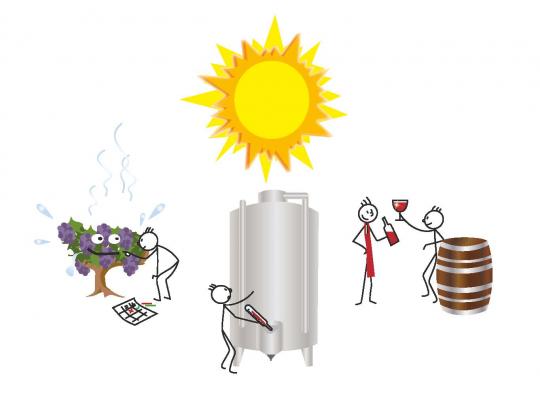Climate change and risks Reading time 3 min
From vine to wineglass: helping every actor adapt to the effects of climate change
Published on 12 February 2019

As with all agricultural production, viticulture is preparing for a warmer, drier climate, as well as the consequences this will have on vine life. However, this will not be the only impact. Winemaking processes and, indeed, wines themselves will also change, since under a different climate the composition of grapes will change. New aromatic balances will therefore have to be found by oenologists for the wines of 2050.
In order to help all these actors prepare for the climate of the future, the LACCAVE project (‘Long-term adaptation to climate change for viticulture and oenology'), brought together and shared knowledge, and produced four scenarios for France’s wine production regions.
A community brought together around adaptation
“The impacts had already been studied separately, but the ACCAF metaprogramme created an opportunity to collaborate on the environmental, social and economic aspects of the vine and wine sector,” explains project co-leader Nathalie Ollat, from the Grapevine Ecophysiology and Functional Genomics joint research unit in Bordeaux. “LACCAVE is an initiative from researchers to answer questions from the sector.” More than a dozen disciplines were brought together, including agronomists, geneticists, phytopathologists, economists and oenologists. In total, more than 100 researchers, 21 laboratories and seven departments participated. They had a clear objective: to appropriate knowledge and share the idea of adaptation between these disciplines. “In four years, we have offered and supervised seven PhDs, organised four seminars and conducted half a dozen scientific popularisation events at the Salon de l'Agriculture, COP 21, with the media etc.,” adds fellow co-leader Jean-Marc Touzard, from the Innovation joint research unit in Montpellier.
Our research work is based on genetic resource collections (RARE infrastructure) and on a high-throughput phenotyping infrastructure (Phenome) which makes it possible to characterize these collections by studying the response of different genotypes to environmental changes. In vines, the genetic response to scarce water resources and increased temperatures has been analyzed using these two infrastructures. There are significant differences in response, in particular stomatal opening, among the varieties present today in the production areas which are the most concerned, thus offering the possibility for the planted grape varieties to evolve. For example the variety Grenache, an emblematic variety of Spain and regions of southern France appears to be sensitive to increased water constraints and temperatures. Increasing genetic diversity, with Italian or Greek varieties, genetic improvement incorporating the response to water constraint as a selection criteria or the evolution in the choice of rootstocks are all potential solutions for French vineyards to adapt.
Find out more: Adapting winegrowing regions to climate change through crop diversification
Rebuilding territorial projects
At the plant scale, the teams highlighted that a reduction in a vine’s nocturnal transpiration could make it possible to limit water consumption, which will help in choosing varieties with low water loss. At the territorial scale, the study of the local variability in temperatures has revealed that a good way to adapt is to rethink the area, relocating vines in the most appropriate spaces, beginning in the existing wine-growing areas. “We have to rebuild territorial projects,” says Nathalie. And concerning consumers, how will they react to the wines of the future? “Experiments have shown that the wines of 2050 could appeal when they are first tasted, but a certain apathy may set in during more recurrent consumption. This is an element to be taken into account by producers and wine merchants as it will affect customer loyalty,” says Jean-Marc.

Innovation for the future
To complement its predictive tools, LACCAVE teams conducted a foresight study on the future of French vineyards, in partnership with INAO (France’s National Institute of Origin and Quality) and FranceAgriMer (the country’s national establishment for agricultural and marine products). Four scenarios were tested - conservative, innovative, nomadic and liberal - and then debated with winegrowers through a series of ‘foresight forums’ in six wine regions. Jean-Marc provides the main conclusions: “These exchanges have highlighted the importance of the issues of land and financial investments. Faced with these constraints, winegrowers opt for the scenario that promotes innovation as a guarantee for the sustainability of their businesses. The profession has shown some concern about changes in their terroir and the loss of family traditions. But they are aware of the collective strength of the wine industry for building responses to climate change.”
Barbeau G, Neethling E, Ollat N, Quenol H, Touzard J-M (2015) Adaptation au changement climatique en agronomie viticole. Agronomie - Environnement et Sociétés 5
Ollat N, Touzard J-M, Van Leeuwen C (2016) Climate Change Impacts and Adaptations: New Challenges for the Wine Industry. Journal of Wine Economics 11:139-149
